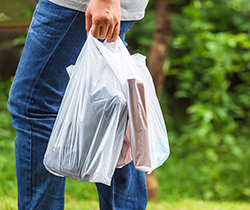Plastics Plan and waste strategy forge ahead
As a key milestone in our mission to cut down on plastic use, reduce waste and make better re-use of our resources, the Plastic Reduction and Circular Economy Bill 2021 was passed through Parliament on 30 November. The Bill will bid farewell to single-use lightweight plastic bags and it will be the last straw for those single-use plastic drinking devices.

Single-use soft plastic shopping bags will a thing of the past by July 2022
The EPA will be responsible for regulation of the new framework and welcomes the opportunity to oversee its implementation.
“The Bill has created a legislative framework to stop the supply of several problematic or unnecessary plastics,” EPA Director Container Deposit Scheme Alex Young said.
“This is something we and the community have been eagerly awaiting. When we asked the community to ‘Have your say’ on the plan in 2020 we attracted more than 16,000 survey submissions – a record for this sort of consultation.”
Lightweight plastic bags will be the first plastic items to be phased out, in the first half of 2022, and while the large supermarkets have already embraced this change, you’ll soon also have to take your own carry bag to collect your favourite takeaway, to the corner shop and your local retailer.
The supply of plastic single-use straws, cutlery, bowls, plates, stirrers and cotton buds with plastic stems and expanded polystyrene serving ware will be banned from 1 November 2022.
“The framework also sets design standards for items for environmental, human health or economic reasons – for instance preventing the supply of certain personal care items containing microbeads,” Alex said.
“And it will set product stewardship requirements for brand owners to take responsibility for waste from regulated products.”
You can view the Bill here.
Workshops engage over 80 councils and waste groups
With $356 million being invested in priority actions over the next five years, the EPA is working closely with local government to support our transition to a circular economy.
Local councils and regional waste groups are key partners in implementing the NSW Waste and Sustainable Materials Strategy 2041 and so we were pleased to meet with many of them recently at a series of online workshops to progress the strategy.
Representatives from 63 local councils and 13 regional waste groups, spanning metro and regional areas, were among the attendees.
“These workshops mark the start of the design phase of implementing the Strategy,” EPA Director for Major Projects and Initiatives Kathy Giunta said.
“We had some really helpful discussions on ways to improve funding mechanisms to help provide waste and recycling services to residents, including for household food and garden organics waste services.
“It is so valuable for us to understand local government perspectives, expertise and circumstances, and we will continue to work with our local government partners to develop effective approaches.
“We held conversations with more than 60 local councils and regional waste groups leading up to the workshops to better understand local government priorities and needs during the transition. This helped us to design a really meaningful session.
“These group discussions complement our close engagement with stakeholders on the rollout of the Strategy through the Local Government and Waste advisory groups.”
What’s next for the waste strategy?
The EPA’s work to drive a circular economy is rolling forwards, with the Waste Delivery Plan now finalised. You can view the final Plan on the EPA website here
The Waste Delivery Plan sets out how and when we will work with our partners, including communities across NSW, industries of multiple sectors and governments at all levels, to deliver these actions and describes how we will monitor and report on our progress.
We acknowledge the extensive consultation that went into finalising the Waste Delivery Plan and look forward to further continuing the design and implementation of its initiatives during 2022.
Happy sustainable Christmas!
The Christmas break is almost here, bringing many families and friends together after a long time apart. This is a great time of year to remember to be kind to our environment by limiting wrapping and packaging, looking for preloved items for gifts through networks or charity shops, buying local (including buying from the bush) and reducing food waste. See our great Sustainable Christmas tips!

